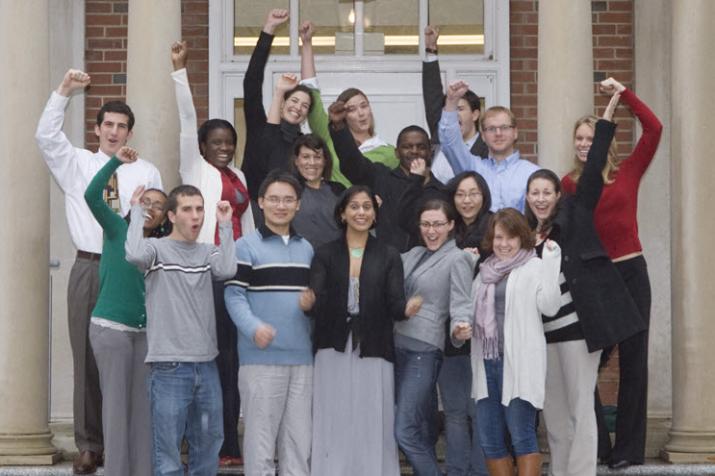
DGHI's first cohort of Master of Science in Global Health students, pictured here, enrolled in the fall of 2009.
Published September 23, 2018, last updated on April 21, 2020 under Education News
When leaders at the Duke Global Health Institute began conceptualizing the Master of Science in Global Health program in 2007—the year after the institute was founded—they had few models to turn to for inspiration.
Although global health master’s degree programs have proliferated in recent years, Duke was one of the first universities to offer the degree.
“We wanted to create a program that would leverage Duke’s interdisciplinary approach, as well as the strong partnerships the University had already built with a number of sites globally,” said Chris Woods, professor of medicine and global health and the first director of the Master of Science in Global Health program.
The goal of the program was to prepare students for a career in global health, particularly for roles rooted in research, says DGHI’s founding director Michael Merson. A planning grant from the Fogarty International Center helped the institute get the program off the ground in 2009.
This fall, under the leadership of program director Melissa Watt and associate director Nathan Thielman, we enrolled our tenth cohort of students. To date, 229 students from 18 countries have graduated from the program. The number of students has grown from 17 students in the first year to between 30 and 40 per year, but the small cohort size still promotes an intimate learning atmosphere.
Multimedia feature: Click to see photos and read alumni and student reflections on their DGHI experience.
The cadre of DGHI faculty has also expanded from a handful in 2009 to more than 80, paving the way for a wider breadth of courses and opportunities for mentored research.
A hallmark of the program from the beginning has been a 10-week or longer field-based research experience that culminates with a thesis, supported with funding and focused faculty mentorship. Over the last 10 years, students have conducted fieldwork in 38 countries.
Another signature component of the program is the flexible, interdisciplinary nature of the curriculum, which enables students to pursue their unique passions within the field of global health. Students take classes with faculty members from across campus, and the students themselves hail from a broad range of backgrounds, from music to anthropology to the health sciences.
DGHI recently launched an accelerated master’s program that will enable a few Duke students to complete their bachelor’s degree and Master of Science in Global Health in five years. Mary Story, associate director for academic programs, hopes this new offering will incentivize Duke undergraduates to pursue graduate studies at their alma mater. Also on the horizon are plans to develop more online courses and explore new ways to collaborate with other schools and programs on campus.
“Looking ahead, I hope the program continues to attract a diverse group of U.S. and international students, because this diversity really contributes to the rich learning environment,” said Watt. “Staying attuned and responsive to emerging global health challenges will also be key to the success of the program.”
The true measure of the program’s impact is in its students and alumni, who have landed in a vast array of roles in NGOs, international agencies, universities, clinics and other settings. To commemorate our tenth anniversary, we reconnected with eight of our graduates, one from each year since 2011, and two current students, to find out what they’re up to and how their DGHI experience helped shape their global health path. We hope you enjoy their stories as much as we do.

